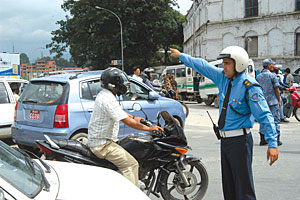 MIN RATNA BAJRACHARYA |
DIG Ganesh Raj Rai has just taken over as the capital's traffic police, and realises that he is damned if he does and damned if he doesn't.
The number of vehicles on the roads has increased 20 fold in the past 15 years, but the road network has remained more or less the same. Whatever Rai does, there is no way he can improve things dramatically unless some crucial link roads are added.
"Whatever we do will be piecemeal," Rai admitted to Nepali Times in his office at the Metropolitan Traffic Police Division. "How long can we try to cope just by blowing a whistle?"
Rai also blames a lack of investment in advanced traffic management, poor traffic discipline on the part of drivers and pedestrians and lack of traffic police. "It's a miracle traffic isn't much worse than it already is," he adds.
Rai says it all boils down to resources. "Adding manpower needs money, new traffic lights need money, adding roads and widening arteries need money."
The capital's roads are managed by, among others, the Department of Roads for repairs, the Department of Transport Management to register and regulate vehicles, the Traffic Police to supervise and enforce traffic regulations, the Ministry of Environment for monitoring air quality and the Metropolitan City has major stake in all this.
"There is lack of coordination and they don't cooperate in traffic management," Rai says, pinpointing the real issue. The number of motorcycles registered in the valley has reached 500,000. To manage the traffic of about 1 million vehicles manually, his department has only 1,000 traffic police. "We need to at least the double the number," he explains.
The general sense of impunity also affects road users, who are not afraid to break the rules. Existing regulations need to be tightened and enforced. "Our rules we made decades ago, they are all obsolete," he adds.
A proposed new traffic bill is languishing in parliament because of other priorities. "I don't know why the government is so indifferent to the traffic problem," Rai says with visible anguish. "It affects everyone from the pedestrian to the president, they should all be trying to help out."
Dewan Rai
Read also:
Joyride
The Prime Minister has set an example by going local, but will he now invest some of the money collected from auto taxes into infrastructure?
"Re-invest auto tax on improving infrastructure"
Interview with NADA chairman Saurabh Jyoti


